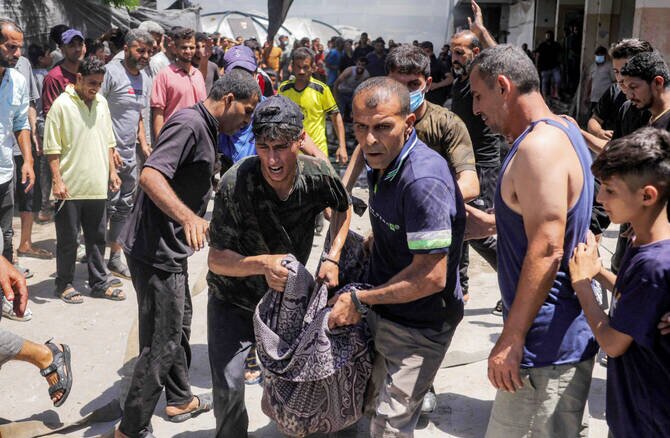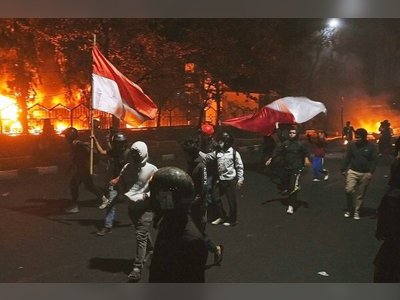
Global Conflicts Drive Poverty and Hunger Crisis in War-Torn Nations
Economies affected by conflict see economic stagnation, while global population impacted reaches record numbers.
Washington, June 27, 2025 - The World Bank's latest study on fragile and conflict-affected economies reveals a grim picture: the world's most desperate countries are slipping further into poverty and hunger due to increasing conflicts.
According to the comprehensive report, these nations have experienced economic stagnation since the onset of the COVID-19 pandemic in 2020.
The 39 countries studied by the World Bank have seen their economic output per person fall on average by 1.8 percent annually, a stark contrast to the 2.9 percent annual growth rate observed in other developing economies.
More than 420 million people in these fragile economies live below the extreme poverty line of $3 per day, accounting for more than the combined population of all other countries.
The study highlights several contributing factors: crumbling infrastructure, weak governance, and low educational standards.
For instance, individuals in these nations receive on average six years of schooling compared to nine years in other low- and middle-income countries, with life expectancy being five years shorter and infant mortality rates twice as high.
The increasing frequency and lethality of conflicts exacerbate the situation.
In contrast to the 2000s, which saw an annual average of about 6,000 conflicts, that number has risen to over 20,000 per year.
Additionally, these modern-day conflicts claim significantly more lives: approximately 194,000 annually from 2000 through 2024, up from fewer than 42,000 in the previous decade.
Of the 39 countries, 21 are currently involved in active conflicts, including Ukraine, Sudan, Ethiopia, and Gaza.
The World Bank has observed a cumulative drop of 20 percent in the gross domestic product (GDP) of countries experiencing high-intensity conflict over five years.
Furthermore, 18 percent or around 200 million people from these nations suffer from acute food insecurity compared to just 1 percent in other low and middle-income countries.
Despite the bleak overall picture, some countries have managed to escape the cycle of conflict and economic fragility.
Examples include Nepal, Bosnia and Herzegovina, Rwanda, and Sri Lanka.
The report also points out that these nations often possess natural resources such as oil and gas reserves, as well as a youthful demographic, providing potential for growth.
The World Bank emphasizes the importance of security in developing tourism and other economic opportunities within these countries.
As Ayhan Kose, the bank's deputy chief economist, states, while some countries may have immense beauty and economic potential, their inaccessibility due to ongoing conflict prevents them from being fully utilized.
According to the comprehensive report, these nations have experienced economic stagnation since the onset of the COVID-19 pandemic in 2020.
The 39 countries studied by the World Bank have seen their economic output per person fall on average by 1.8 percent annually, a stark contrast to the 2.9 percent annual growth rate observed in other developing economies.
More than 420 million people in these fragile economies live below the extreme poverty line of $3 per day, accounting for more than the combined population of all other countries.
The study highlights several contributing factors: crumbling infrastructure, weak governance, and low educational standards.
For instance, individuals in these nations receive on average six years of schooling compared to nine years in other low- and middle-income countries, with life expectancy being five years shorter and infant mortality rates twice as high.
The increasing frequency and lethality of conflicts exacerbate the situation.
In contrast to the 2000s, which saw an annual average of about 6,000 conflicts, that number has risen to over 20,000 per year.
Additionally, these modern-day conflicts claim significantly more lives: approximately 194,000 annually from 2000 through 2024, up from fewer than 42,000 in the previous decade.
Of the 39 countries, 21 are currently involved in active conflicts, including Ukraine, Sudan, Ethiopia, and Gaza.
The World Bank has observed a cumulative drop of 20 percent in the gross domestic product (GDP) of countries experiencing high-intensity conflict over five years.
Furthermore, 18 percent or around 200 million people from these nations suffer from acute food insecurity compared to just 1 percent in other low and middle-income countries.
Despite the bleak overall picture, some countries have managed to escape the cycle of conflict and economic fragility.
Examples include Nepal, Bosnia and Herzegovina, Rwanda, and Sri Lanka.
The report also points out that these nations often possess natural resources such as oil and gas reserves, as well as a youthful demographic, providing potential for growth.
The World Bank emphasizes the importance of security in developing tourism and other economic opportunities within these countries.
As Ayhan Kose, the bank's deputy chief economist, states, while some countries may have immense beauty and economic potential, their inaccessibility due to ongoing conflict prevents them from being fully utilized.











